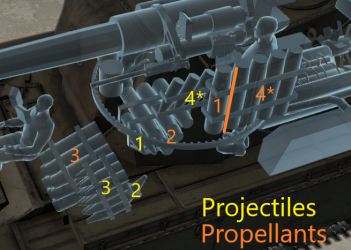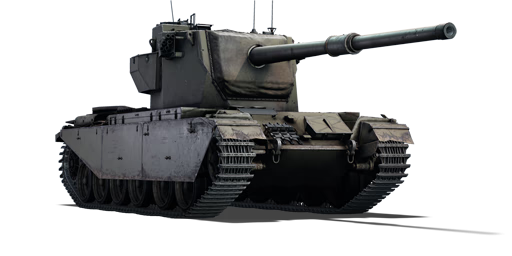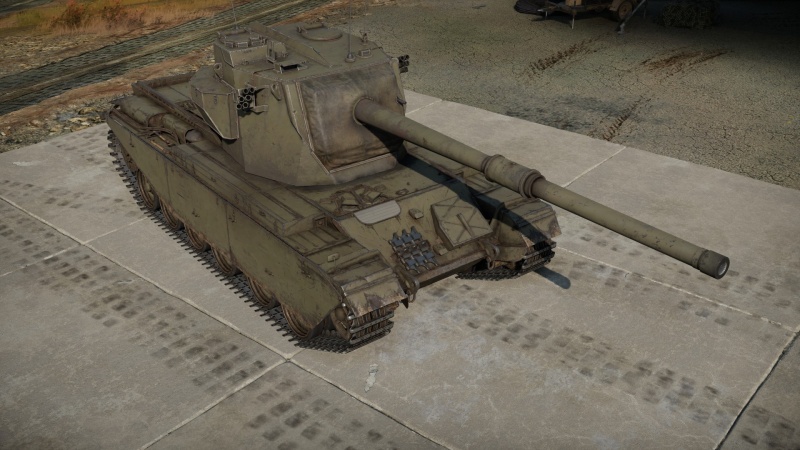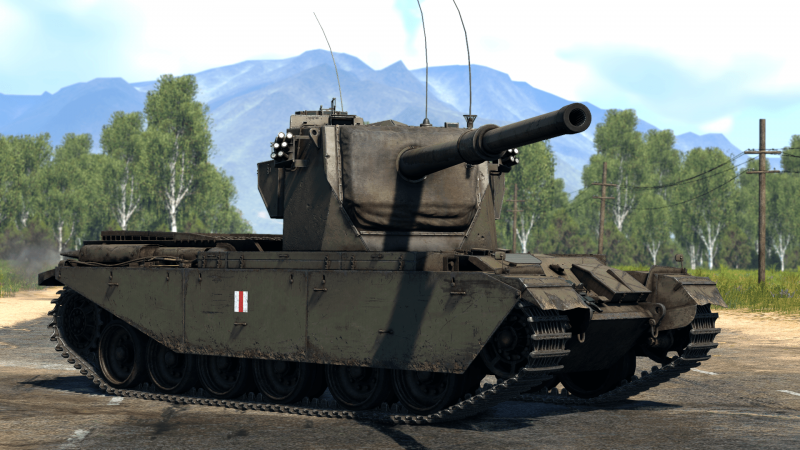Difference between revisions of "Conway"
m (→Main armament: Grammar) (Tag: Visual edit) |
(→Pros and cons: Added additional pros.) (Tag: Visual edit) |
||
| Line 169: | Line 169: | ||
* Excellent long range support thanks to the high muzzle velocity of the APDS shells | * Excellent long range support thanks to the high muzzle velocity of the APDS shells | ||
* Large calibre APDS still often leads to one-shots | * Large calibre APDS still often leads to one-shots | ||
| + | * Incredibly high pennetration APDS rounds | ||
| + | * Responsive turret | ||
| + | * Autocannon-proof turret | ||
| + | * Fully traversible turret (As opposed to FV4005) | ||
'''Cons:''' | '''Cons:''' | ||
Revision as of 12:02, 7 December 2022
Contents
Description
The FV4004 Conway is a rank IV British tank destroyer with a battle rating of 6.7 (AB) and 7.0 (RB/SB). It was introduced in Update 1.57 "Battle March". It is armed with a cannon developed to take on the heavy Soviet IS-3 tank. It excels in fighting the top-rank heavies.
The Conway plays similarly to the KV-2. It has sub-par armour on all sides and has a very large-calibre gun, able to penetrate everything it faces, severely damaging most. However the incredibly high-velocity APDS, faster turret traverse and faster reload differ distinctly from the KV-2. It can be played as an usual tank destroyer, excelling at it with its high velocity APDS rounds, sniping from a distance.
General info
Survivability and armour
The turret front can shrug off smaller calibre rounds at long range and is resistant to HMGs, unlike the FV4005.
Armour type:
- Rolled homogeneous armour
- Cast homogeneous armour (Gun mantlet)
| Armour | Front | Sides | Rear | Roof |
|---|---|---|---|---|
| Hull | 76.2 mm (58°) Front glacis 76.2 mm (47-48°) Lower glacis |
50.8 (12°) + 6 mm | 38 mm (8-12°) | 29 mm 8-14 mm Engine deck |
| Turret | 132 mm (19°) Turret front 140 mm (7-61°) Gun Mantlet |
95 mm (0-6°) Front 47 mm (2°) Middle 30 mm Rear |
30 mm Border 20 mm Hatch |
17 mm |
| Cupola | 47 mm | 47 mm Right 30 mm Left |
30 mm | 47 mm |
Notes:
- Suspension wheels are 20 mm thick while tracks are 30 mm thick.
- Turret sides are angled, causing inaccurate shots to bounce.
Mobility
The Conway possesses standard mobility. The chassis is identical to that of the Centurion mk.III tank, but with a heavier turret, causing slightly worse mobility than the aforementioned MBT. When stock, the Conway can be very sluggish, especially up hills, but with tracks, brakes and engine modules researched it becomes mobile to an acceptable degree, but still not enough to be an ambusher.
The Conway has a fair top speed, but shines significantly with its -12km/h reverse speed, allowing the Conway to peak, fire and swiftly retreat into cover.| Game Mode | Max Speed (km/h) | Weight (tons) | Engine power (horsepower) | Power-to-weight ratio (hp/ton) | |||
|---|---|---|---|---|---|---|---|
| Forward | Reverse | Stock | Upgraded | Stock | Upgraded | ||
| Arcade | 41 | 14 | 49.8 | 902 | 1,212 | 18.11 | 24.34 |
| Realistic | 38 | 13 | 562 | 635 | 11.29 | 12.75 | |
Modifications and economy
The first upgrades to research are "Parts" and "FPE" for increased survivability. Once you got these two, go for "Adjustment of Fire" and "Elevation Mechanism", since these modules increase the accuracy of the gun.
Armaments
Main armament
The most notable attribute of the Conway is the incredible 120mm OQF Tk. L1A2 cannon. The gun is capable of firing devastating APDS rounds with over 300mm of penetration, even beyond 2km, as well as slower HESH rounds useful for overpressuring or indirect fire against entrenched targets.
Both ammunition types for the 120mm cannon are available stock, and you will most of the time make use of the APDS round, as it is significantly superior in offensive capability compared to the more specialized HESH round (Which functions like HE on similar tanks).
The Conway suffers from bad gun depression angles as well as a long reload. If you do not take out your enemy in one shot, they have plenty of time to retreat before you're reloaded.
| 120 mm Ordnance QF Tk. L1A2 | Turret rotation speed (°/s) | Reloading rate (seconds) | |||||||||||
|---|---|---|---|---|---|---|---|---|---|---|---|---|---|
| Mode | Capacity | Vertical | Horizontal | Stabilizer | Stock | Upgraded | Full | Expert | Aced | Stock | Full | Expert | Aced |
| Arcade | 20 | -5°/+10° | ±180° | N/A | 15.8 | 21.9 | 26.6 | 29.5 | 31.3 | 19.37 | 17.14 | 15.79 | 14.90 |
| Realistic | 10.7 | 12.6 | 15.3 | 16.9 | 18.0 | ||||||||
Ammunition
The Shot L1G is the main round used by the Conway. The round velocity (almost 1,500m/s) is completely unrivaled at the vehicle's BR. This will be the main shell used in-battle. The Shot L1G has incredibly high penetration, enough to go through Tiger IIs, IS-3s and even Mauses indiscriminently, however suffers from low spalling due to the sub-callibre projectile. This means a penetration does not guarantee a kill if vital enemy components are not hit. Due to this it is recommended to aim for ammunition and crew in enemy vehicles, instead of focusing on armour weakpoints.
The Shell L1TK is an auxiliary round for the Conway. The significantly slower HESH round packs a punch, but is mostly only suitable for very favourable situations. The long reload of the Conway means switching over to HESH can take very long (up to almost 20 seconds with full crew), at which point the situation the HESH was suitable may have faded. Switching to HESH can also make the vehicle vulerible to threats from long range.
| Penetration statistics | |||||||
|---|---|---|---|---|---|---|---|
| Ammunition | Type of warhead |
Penetration @ 0° Angle of Attack (mm) | |||||
| 10 m | 100 m | 500 m | 1,000 m | 1,500 m | 2,000 m | ||
| Shot L1G | APDS | 362 | 361 | 359 | 354 | 339 | 321 |
| Shell L1TK | HESH | 152 | 152 | 152 | 152 | 152 | 152 |
| Shell details | |||||||||
|---|---|---|---|---|---|---|---|---|---|
| Ammunition | Type of warhead |
Velocity (m/s) |
Projectile Mass (kg) |
Fuse delay (m) |
Fuse sensitivity (mm) |
Explosive Mass (TNT equivalent) (g) |
Ricochet | ||
| 0% | 50% | 100% | |||||||
| Shot L1G | APDS | 1,493 | 7.6 | N/A | N/A | N/A | 75° | 78° | 80° |
| Shell L1TK | HESH | 792 | 15.87 | 0.1 | 4 | 3,970 | 73° | 77° | 80° |
Ammo racks

| Full ammo |
Ammo part |
1st rack empty |
2nd rack empty |
3rd rack empty |
4th rack empty |
Visual discrepancy |
|---|---|---|---|---|---|---|
| 20 | Projectiles Propellants |
18 (+2) 20 (+0) |
17 (+3) 14 (+6) |
5 (+15) 5 (+15) |
1 (+19) 1 (+19) |
No |
Notes:
- The Conway uses two-piece ammunition, composed of projectiles (yellow) and propellant bags (orange). Both have separate racks.
- Projectile and propellant racks 4 are first-stage ammo racks.
Machine guns
| 7.62 mm L3A1 | ||||
|---|---|---|---|---|
| Mount | Capacity (Belt) | Fire rate | Vertical | Horizontal |
| Coaxial | 3,750 (250) | 500 | N/A | N/A |
Usage in battles
As a tank destroyer, you might want to go for heavy tank hunt. In this case, you should check the battle rating of opposing team. Despite having heavy gun, your best bet in uptier would be long range flank sniping. This is due to APDS doing less damage to crew and components, the thicker the armour it penetrated was, thus doing minimal damage through heavy tank's frontal armour. As such, you are less dangerous to superheavy tanks (especially the ones from 8.0) from front, compared to FV 4005, which many players will mistake you for. You still can penetrate most of breakthrough tanks, forcing them to retreat or slip up at critical moment. Since APDS is super high velocity, you can snipe across the map with little issue, and do fatal damage from sides.
To everything else you are extremely dangerous, and, if detected, have some presence factor. This can be beneficial and bad at same time, since you can scare off heavy tanks and attract medium and light tanks, and even other SPGs. Your turret might hold off a few stray shots from distant or weak opponents, but your hull is still quite fragile, and reload times are still too long, so there is no room for mistakes at close range duels. For these reasons, if possible, adversaries must be kept away from you, so their guns are inadequate at fighting you, your hull must be kept hidden, and enemy SPG and "sniper" oriented medium tanks must be neutralized on sight.
In case a light vehicle is stalking you, it's better to just load HESH, provoke the enemy, then hopefully blast them away. Heavily-armoured vehicles are still more vulnerable to APDS than HESH regardless of range, unless you hit them at specific weak spots with it.
Pros and cons
Pros:
- Very powerful 120 mm gun
- Excellent long range support thanks to the high muzzle velocity of the APDS shells
- Large calibre APDS still often leads to one-shots
- Incredibly high pennetration APDS rounds
- Responsive turret
- Autocannon-proof turret
- Fully traversible turret (As opposed to FV4005)
Cons:
- Unreliable armour profile
- Low mobility
- Tall profile
- Only carries a maximum of 20 shells
- Long reload time
- Insufficient gun depression
History
When the Centurion tanks entered service in British service in 1945, the British didn't take into account the sudden appearance of the Soviet IS-3. The IS-3 tank showed the Western Allies needed to reconsider their tank inventories, which at the time the IS-3 was introduced only composed of mostly M4 Sherman, M26 Pershing, and Centurions. The British, recognizing the need for a bigger gun to fight the IS-3, started producing the Conqueror. However, development takes time and the Conqueror would not be ready until 1955. As an interim project until it is done, the British took a Centurion Mk 3 tank and upgraded with a new turret made from rolled plate that can mount the 120 mm L1 gun, the same gun meant for the Conqueror. This vehicle, designated the FV4004 Conway was to have the heavy armament, yet the same manoeuvrability as the base Centurion. One of such vehicle was made in this matter before the whole thing was cancelled in 1951. The sole piece made is now stored at the Bovington Tank Museum.
Another attempt at this kind of mounting with the Centurion was the FV4005, which was meant to be a tank destroyer with a larger 183 mm gun. The project started in 1951 and developed in July 1955. The gun was mounted in a similar fashion as the Conway on a lightly armoured turret. This was a limited production and by August 1957, the whole project was disassembled. The FV4005 also has survived in the Bovington Tank Museum.
Media
- Skins
- Videos
See also
Links to the articles on the War Thunder Wiki that you think will be useful for the reader, for example:
- reference to the series of the vehicles;
- links to approximate analogues of other nations and research trees.
External links
| Department of Tank Design | |
|---|---|
| Medium Tanks | |
| Sherman Firefly | Sherman Firefly · Sherman IC "Trzyniec" |
| MBTs | |
| Centurion | Centurion Mk 1 · Centurion Mk.2 · Centurion Mk 3 · Centurion Action X · Centurion Mk.5 AVRE · Centurion Mk 10 |
| Challenger* | Challenger Mk.2 · Challenger Mk.3 · Challenger DS |
| Tank Destroyers | |
| Achilles | Achilles · Achilles (65 Rg.) |
| Centurion-based | Conway · FV4005 |
| Export | |
| Sherman Firefly | Sherman Ic · ▄Sherman Vc |
| Centurion | Centurion Mk.5/1 · Strv 81 · Strv 81 (RB 52) · ▄Strv 81 (RB 52) · Strv 101 · Strv 104** · Strv 105** · Sho't |
| See also | US Ordnance Department · Israeli Ordnance Corps · Vickers-Armstrongs Limited |
| *By successor, the Military Vehicles and Engineering Establishment | |
| **Swedish modernizations incorporating innovations from the Israeli Sho't Kals. | |
| Britain tank destroyers | |
|---|---|
| Infantry tank derivatives | Archer · Gun Carrier (3-in) |
| Light tank derivatives | Alecto I |
| M10 Achilles | Achilles · Achilles (65 Rg.) |
| Centurion derivatives | FV4005 · Conway |
| ATGM | Swingfire · Striker |
| Other | Tortoise · ▄M109A1 |
| Canada | QF 3.7 Ram |
| South Africa | G6 · ZT3A2 |






